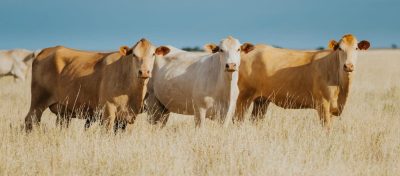UNDERSTANDING the performance of cattle in tropical environments is crucial for optimising productivity.
Research from the long-gone Beef Cooperative Research Centre (CRC) continues to provide valuable insights into improving beef production, especially in the challenging climates of northern Australia.

AA Co composite breeders on the Barkly Tableland
Among the most impactful studies is the work by Barwick et al (2009), titled “Genetics of Heifer Performance in ‘Wet’ and ‘Dry’ Seasons and Their Relationships with Steer Performance in Two Tropical Beef Genotypes.”
This study investigates the genetic factors affecting cattle performance in tropical conditions, focusing on Brahman and Tropical composite (TCOMP) breeds, and offers significant insights into the genetic traits that influence both heifer and steer performance across different seasons.
The primary objective of the project was to explore how heifer traits, such as liveweight and fat deposition, correlate genetically with steer performance traits, including average daily gain, feed intake, and residual feed intake.
The study encompassed data from 2159 heifers (1027 Brahman and 1132 Tropical Composite), with 54 Brahman and 51 Tropical Composite sires. Heifer traits were measured after both wet and dry seasons, and steer performance was evaluated through a feedlot test that spanned approximately 70 days, followed by a 120-day finishing period.
The study found significant performance differences between Brahman and Tropical Composite heifers over wet and dry seasons. Brahman heifers demonstrated faster growth during the wet season but slowed in the dry season, whereas Tropical Composites maintained more consistent growth across both seasons.
Brahman heifers also exhibited greater body fat and higher insulin-like growth factor-I (IGF-I) levels compared to their Tropical Composite counterparts, traits likely tied to Brahman’s longer adaptation to tropical climates, which favour resilience in heat and limited feed availability during dry periods.
The study estimated heritabilities for key traits between 20pc and 60pc across both genotypes. However, Brahman cattle generally exhibited lower genetic variances and correlations.
This suggests that while Brahmans are well-adapted to tropical conditions, their genetic variability for improvement in certain traits may be more limited compared to Tropical Composites. Nonetheless, there is room for genetic improvement through targeted selection, particularly in feed efficiency and growth.
High genetic correlations between traits in both wet and dry seasons were found, suggesting that animals performing well in one season tend to perform similarly in the other.
However genetic correlations between heifer and steer performance traits were often lower, particularly in Brahman cattle. For instance, the correlation between ADG in heifers and steers was low, indicating that the genetic factors influencing growth and efficiency may differ between the sexes.
It was also notable that there was a moderate-to-high genetic correlation between steer RFI and muscle area in Brahman heifers. This suggests that selecting for feed efficiency in Brahman steers could also enhance muscle growth in heifers.
For Tropical Composites, positive correlations between fat and muscle traits indicate that selecting for increased muscle mass would not negatively impact fat deposition, a desirable characteristic for maintaining meat quality. These findings highlight the importance of balancing feed efficiency, growth, and meat quality traits when designing breeding programs.
Additional Insights
The study observed that genetic correlations between traits declined as environmental conditions became more divergent. This suggests that certain traits, such as growth and body condition, are more sensitive to environmental changes, particularly in tropical climates, where the wet and dry seasons present vastly different challenges.
Fat and Muscle Correlations
In Tropical Composite cattle, the study found that fat and muscle measures were positively correlated. This means that selecting for increased muscle would not negatively affect fat deposition, an important factor for meat quality. However, the opposite was true for Brahman cattle, where a negative correlation between fat and muscle suggests that selecting for one trait could reduce the other. This finding is critical for breeders looking to balance meat yield and quality, especially in markets where both attributes are valued.
Residual Feed Intake (RFI) in Brahman Heifers
The moderate-to-high genetic correlation between RFI in steers and muscle area in Brahman heifers indicates that selecting for improved feed efficiency in Brahman cattle may simultaneously enhance muscle growth. This dual benefit is particularly appealing for producers aiming to improve both feed efficiency and carcass quality in their herds.
Practical implications for beef producers
This study provides valuable insights for beef producers, particularly those in tropical environments. The findings suggest several practical considerations for breeding programs:
- Brahman Cattle: While well-adapted to tropical climates, Brahman cattle may benefit from more targeted selection efforts to improve growth rates and feed efficiency during the dry season without sacrificing adaptability to heat and sparse forage conditions.
- Tropical Composites: The positive correlations between fat and muscle traits make Tropical Composites an appealing option for maintaining both meat quality and yield.
- Sex-Specific Selection: The low genetic correlations between heifer and steer traits, especially in Brahman cattle, suggest that breeding strategies should consider the differing roles of heifers and steers. Optimising selection criteria for each sex could improve overall herd performance.
- Seasonal Consistency: The high genetic correlations between corresponding traits in wet and dry seasons indicate that animals performing well in one season are likely to perform similarly in the other, simplifying selection processes for year-round performance.
Overall, the study continues to support more recent research as well as providing useful insights for breeders to improve cattle performance in tropical environments through targeted selection, enhancing both productivity and adaptability in challenging climates.
 Alastair Rayner is the General Manager of Extension & Operations with Cibo Labs and Principal of RaynerAg. Alastair has over 28 years’ experience advising beef producers & grasiers across Australia. He can be contacted here or through his website www.raynerag.com.au
Alastair Rayner is the General Manager of Extension & Operations with Cibo Labs and Principal of RaynerAg. Alastair has over 28 years’ experience advising beef producers & grasiers across Australia. He can be contacted here or through his website www.raynerag.com.au
